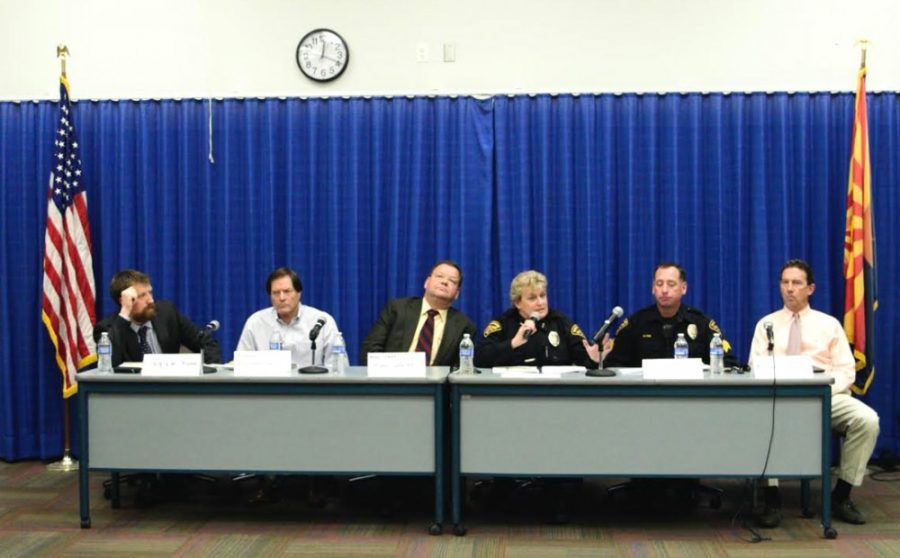Police officers and lawyers gathered for the Black Law Students Association’s installment of its Black History Month panel series, “To Protect and Serve: A Police Perspective on the Use of Deadly Force.”
The discussion took place Wednesday at the James E. Rogers College of Law. The event focused on a discussion of deadly force, racial biases and police stereotypes portrayed in the media.
The panel consisted of Deputy Chief Sharon Allen, Assistant Chief John Leavitt, Officer Benjamin Frie, Tucson attorney Michael Storie and adjunct professor Rick Unklesbay.
“One thing I thought was really interesting was that there were, like, seven speakers on the panel, and all of them were white,” said Jacqueline Lira, a sophomore studying criminal justice and political science.
Lira added that she was aware some of the speakers were chosen for their positions, but the fact they were all white was noticeable.
As the panel discussed the use of deadly force on behalf of the police, Jason Buckner, a first-year law student, addressed the panel.
“You’ve gone from protecting the community to protecting each other,” Buckner said. “I’m just curious as to what your prioritization is.”
In response to this, Leavitt said that the crime rate was at an all-time low, and that this hysteria was a result of the 24-hour news cycle.
“When we use a firearm, our goal isn’t to kill anyone,” Leavitt said. “It is to stop them.”
Robert Marquez, a criminal justice sophomore, was one of the several students who attended the event.
“I think [the media tries] to make [shootings] look more dramatic than [they] really [are],” Marquez said. “They try to put police officers on the spot, especially if the person shot is of a different race. They don’t have all the evidence, but they show what people want to see, to make the police look bad.”
Storie, a law enforcement attorney, stated that he’s had cases where he has to console police officers after they have had to use deadly force.
“It scars them,” Storie said. “If you think [police officers] are standing in an office, with their chests puffed out getting high fives, you are sadly mistaken. I have, routinely, at 2 in the morning, woken up and have had to hold an officer who is crying.”
When asked about racial biases in the police department, Leavitt said, “We hire from the human race. People have racial biases. It’s a constant battle in any profession, I think.”
The Black History Month panel series will continue on Feb. 18 and 25, from noon to 1:15 p.m., at the College of Law, Ares Auditorium. The panels are set to focus on “Diversity in Higher Education: The Admissions Process” and “Side by Side for Social Justice: Broadening Your View to See the Bigger Picture.”
_______________
Follow Terrie Brianna on Twitter.









